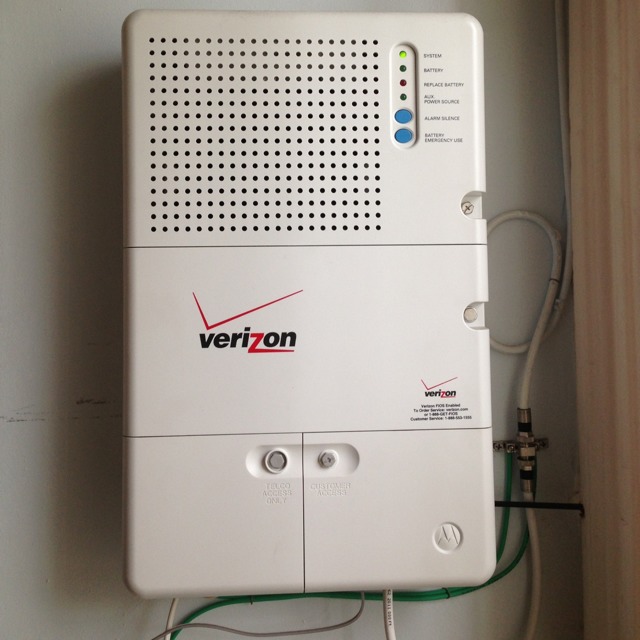Robo-Calls End Today
- Leave a Comment
- Shortlink
- 5 min
One of the hallmarks of the Telecommunications Act of 1996 has been the advent of bundling. As a Verizon FiOS customer, the double-play bundle of reasonably fast Internet (almost symmetrical 25 Mbps downstream and 30 Mbps upstream) and a fiber optic landline costs significantly less than the broadband-only service at the same speed. Rather than settle for a slower connection at a lower price, I take the “free” fiber-optic telephone.
“Wait,” you might be asking, “What’s the difference between a fiber-optic telephone line and a regular landline?” One big difference is that in the event of a power outage, your new fangled fiber-optic phone will only work with a big backup battery pack.[1] The one on my kitchen wall measures 11-inches by 17-inches, the same size as a tabloid sheet. Your old plain copper-wire telephone works if the electrical grid goes awry, which does happen, but not your trusty mobile phone or the new fiber phone.

As far as the benefits and drawbacks go, that’s the trade off for zero-cent-per-minute long-distance calling. Let’s call that an even swap.
But what makes fiber phone kind of a bad deal is that I still get robo-calls during competitive elections, such as today’s New York City primary election. We don’t (yet) get those on mobile phones, but we do received them on a line that is tethered by glass.
In order to get a less throttled Internet connection for less money, I’ve had to endure countless robo-calls during the last few weeks. Because Verizon FiOS voicemail will email you an audio file of your message, it has been really easy to collect some of the more memorable robo-calls of this primary season. Here are some of them.
Daniel Squadron
A common template for the robo-calls is to get someone recognizable to “call” you to discuss the candidate’s strengths and the newspapers endorsing the candidates. Here’s one where Senator Chuck Schumer waxes about Daniel Squadron, the candidate for public advocate.
Bill Thompson
My name gets me on some Latino-targeted lists, for marketing, banking, and now electioneering. Here’s Bill Thompson’s campaign calling me. Notice how it is both in English and then en español.
The message identifies me as someone with an immigrant’s experience. It mentions his family’s experience of immigrating and struggling in this new land. It also uses “community” [“communidad”] as a way of tapping into my Latino sensibilities to relate to this candidate.
Peter Vallone
Using the immigrant experience is a powerful strategy for creating sympathies between a voter and a candidate. Peter Vallone, Jr., who is running for Queens Borough President, has been aggressively sending email and postal mail. One of the latter was a flyer about the Peter F. Vallone Scholarship, which his campaign calls the city’s “original Dream Act.” None of the calls I received mentioned the scholarship, but instead mentioned his strengths as a “law and order” candidate. Here he is doing his own calling but still following the template of strengths and endorsements.
Christine Quinn
As persistent as Vallone was, the Christine Quinn campaign was the most aggressive, likely due to her well-funded campaign. The campaign called early in the summer to ask if “she could count on my vote.” They sent a high school student to my apartment to talk with me about Quinn and distribute some literature. And speaking of literature, the campaign has mailed me a flyer or ten in the last few weeks.
And, again, because of my Latino name and background, some Spanish-speaking luminaries have been calling me to talk about Quinn’s strengths and endorsements.
And pulling out all the stops today, Election Day, she “called” me herself.
Anthony Weiner
Last and late to the party was Anthony Weiner. He didn’t play up the Latino angle, which is probably wise because it could remind me about Carlos Danger and all that unpleasantness. Instead, he kindly asked me to join a telephone “town hall” conversation.
Since it was during my Monday night class, I missed it. And he called me to remind me that I bailed on him.
I’m not sure what the second call was meant to accomplish other to have me think of him. It did, and I am.
Today, I’m happy because the robo-calls should end after this primary election. Or else, I guess there’s always the run-off in October.
-
According to Verizon’s Terms and Conditions, “Where applicable, battery backup available for standard fiber-based voice service, FiOS Digital Voice & E911 (but not other voice services).” ↩



